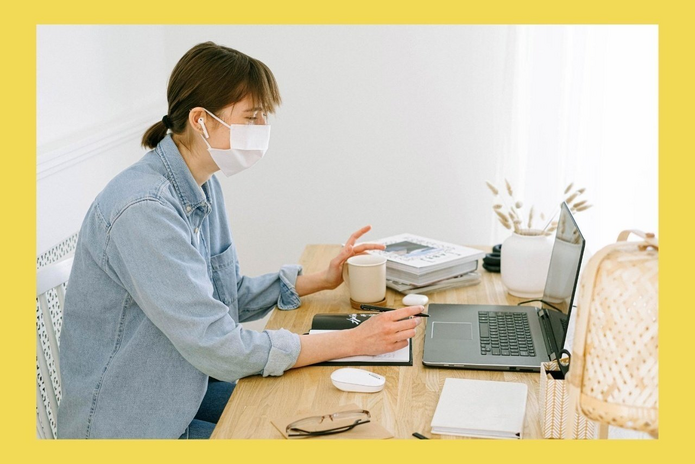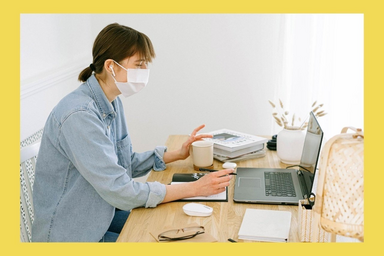I wish I could say Coronavirus has come and gone but, as we all know, it hasn’t. It’s changed the world as we know it, and will certainly make the chapter on 2020 an interesting read in future history books. Zoom calls, social distancing, and a shortage of sanitizing products are just some side effects of this virus. And masks, of course, which are definitely here to stay. But what about life post-quarantine? With most states out of lockdown, despite the ongoing crisis, one thing is clear: we aren’t out of the woods yet. So, what happens when we are?
The entire world is craving normalcy, but when people say they want life to go back to normal, I’m not sure they even know what that really means. What are the societal impacts going to look like even after a vaccine is developed and this pandemic is finally under control? Here are five things I think will become a bigger part of normal life post-COVID:
- More concern about mental health
-
Back in March, when the Coronavirus first caused nationwide lockdowns and school shutdowns, I checked the CDC website regularly. Since then, a brand-new section has been added that’s focused on mental health and ways to manage any stress or anxiety caused by the pandemic.
Whether COVID-19 has impacted your physical health or not, it’s clearly affecting everyone’s mental state. For many people, at least in the United States, the scale of this crisis brings to mind 9/11 or the financial crisis of 2008, two life-changing events that reshaped much of how this country functions. We’re not living in a post-COVID world quite yet, but let’s talk about how it’s affecting mental health right now. Worrying about a new disease and what could happen if you contract it can be extremely overwhelming. Yet, by staying safe and distancing yourself from friends and loved ones you may be left feeling isolated and lonely, two warring feelings that can definitely increase stress and anxiety.
Makena, a rising junior at the University of California, Davis, shares how living alone in quarantine has impacted her mental well-being and how she’s chosen to grow through her experiences. “It’s crazy to think how much self-realization can come from being with oneself in quarantine,” she says. “I was living alone and I definitely dealt with some challenges to my mental health. However, my mental clarity was also heavily strengthened through my ability to recognize my needs over those of others. It sounds selfish, but I believe taking time to focus on one’s mental capacity and wellbeing is far more important than any work-related assignment or minuscule daily task. A strong mind is equal to a strong body and COVID-19 definitely emphasized this for me.”
As Makena said, the need to focus on mental health and well-being during the pandemic is so important. However, what happens post-COVID? How will mental health challenges that arose during the pandemic affect us in the future? Licensed psychotherapist Rachel Tombaugh (MA, LPC, NCC) shares her own hypotheses about that very question. “The effects of the pandemic in all of its many facets, although already quite visible and expansive, will likely not be fully understood or quantified for years, if not decades,” she says. “We are already observing increases in depression and anxiety and we cannot be sure how this will continue to unfold. Our best option for our mental and emotional wellbeing is to connect with others as safely, often, and as meaningfully as we can in order that we can support and help one another in coping with a very different life than many people could ever have expected.”
Luckily, we have mental health professionals like Rachel to help get us through these tough and trying times. No one has a crystal ball that can predict the future, but together we’ll get through this pandemic and come out stronger on the other side.
- A greater acceptance for working from home & remote learning
-
Most universities moved to online instruction for the remainder of the spring 2020 semester, and many schools are continuing with online instruction for the duration of fall 2020 as well, leaving current students with a pretty good handle on how to go to school online. More people than ever before have also experienced working remotely, whether it be through internships or their careers. Many companies that have never allowed remote work before moved completely online for the duration of state stay at home orders, if not longer. With a new, steady routine of Zoom and Microsoft Teams meetings, not to mention the short bed-to-desk commute every morning, this is likely to remain the reality for many companies moving forward.
Having had a taste of the telecommuting life, many students, teachers, employees, and even employers are likely to demand more of it. After all, it’s cheaper not to pay for the office space. It also saves on commuting policies and minimizes company travel expenses. Some companies are already planning to allow their employees to work from home permanently in the post-pandemic world. Twitter, Facebook, Shopify, and many more big businesses have already released statements about how they plan to normalize working remotely.
- A higher stake in voting than ever before
-
Voting has always been a pretty big source of contention each election cycle, but it feels bigger than ever this year. With the Coronavirus guaranteed to still be a threat come November, the voting system must be changed to accommodate the health and safety of all US citizens. Say goodbye to big crowds and long lines – instead, voters can expect expanded early voting and no-excuse mail-in balloting. Both of these changes effectively turn Election Day into Election Month.
Julia, a rising sophomore at Wayne State University, thinks that mail-in voting will change the game in terms of motivating young voters to make their voices heard. “There is literally no excuse not to vote now. Mail-in ballots get rid of any difficulties when it comes to transportation or timing. I really hope that, with our current political state and with the normalization of mail-in voting, young people are more encouraged to use their voice and vote in this upcoming election.”
Of course, it’s important to be wary of the challenges the United States Postal Service is facing and how what’s happening with the USPS could affect your ballot. The possible dismantling and defunding of the USPS is most definitely something that could slow down your mail-in vote come November. So, don’t be afraid to mail your ballot in early this coming election. Even if it feels unnecessarily early, it’s necessary your vote is counted.
- A continuing shift to online shopping
-
This one might seem a bit obvious, but online shopping is definitely the way to go right now. And in a post-coronavirus world, I can only imagine that more brick-and-mortar retail shops will be closing. The virus has simply accelerated a trend that was already on the rise. Why go into a store when you can get everything you need by simply clicking a few buttons on your phone?
Danielle, a rising senior at Loyola Marymount University, shares her feelings on in-person shopping as well as the online alternative. “I’m personally super hesitant to go back to any one of LA’s crowded shopping malls and I know my friends are too,” she explains. “Most of my college friends have just been buying their clothes or dorm/apartment decor online, myself included. Online shopping during the pandemic has not only been more convenient, but it’s become a bit of a habit for me. And I think it’s a habit that’ll be hard to break even after COVID-19 is gone.”
I’m definitely interested to see how brick-and-mortar stores fare in the post-pandemic world since I’ve always been someone who loves shopping and going to the mall, but I guess we’ll just have to wait and see what happens.
- A new look at physical touch
-
The havoc caused by COVID-19 has already led a lot of people to rethink simple social norms like shaking hands or giving friendly hugs. This way of thinking begs the question, is touch becoming taboo? As people attempt to better protect themselves and the people they love during the pandemic, new ideas about personal hygiene and social behaviors are bubbling to the surface. People are washing their hands more often and are avoiding touching public objects when and where they can. Even greetings that don’t involve hand-to-hand contact are becoming more popular, like air high-fives or tapping elbows (something I noticed MLB players doing on TV).
Jackie, a rising sophomore at the University of Michigan, weighs in on this lack of physical contact and the legacy it’ll leave behind. “I’ve definitely felt the effects of COVID-19, especially when it comes to living in my sorority house. In a place where ‘cuddle puddles’ are the norm, we now face strict rules and lots of extra precautions in order to limit possible spread of the virus,” she says. “And while these changes aren’t permanent, I think they’ll still leave behind lasting effects even after a vaccine is distributed.”
It’s hard to imagine, but physical touch might never again be seen as a casual thing. Even after a vaccine! Why? Well, the fact is that even after a vaccine is made available to the public, the disease won’t just disappear. So, showing affection by physically touching someone may very well end up being something that remains reserved for important moments only, or one’s closet friends. Everyday greetings to acquaintances or strangers might be better left as a verbal-only type of thing.
The coronavirus has taught us more lessons than we ever wanted or planned to learn. I think it’s fair to say we weren’t exactly prepared to tackle a global pandemic, but we can definitely work together to prepare ourselves for facing the new normal that’s waiting for us on the other side of COVID-19.


